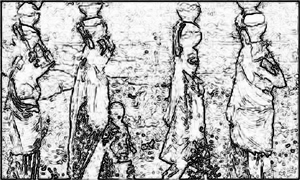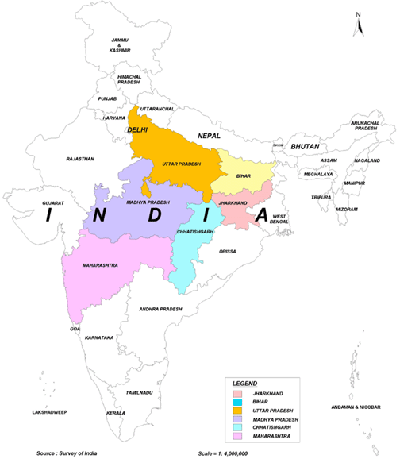|
War Against Poverty
Desmond Roberts I ndia’s population is well over one billion, and by 2035 she is expected toFor long, poverty reduction programmes have been delivered in partnership
with select state governments and the national government. Despite these efforts, it still excludes a large number of people below the poverty line, who need to be included in order for India to achieve the Millennium Development Goal (MDG) of halving its poverty by 2015. With this objective, Department for International Development (DFID) India’s country strategy envisages working with civil society in the poorest districts of India to initiate a movement for a world free from hunger. In India, Civil Society Organisations (CSOs) are recognized as important contributors to improve the quality of life of the poor and disadvantaged people. However, many grassroots organisations lack capacity to define their roles and respond to the needs of the people. Though, they have a strong desire to contribute to the development of the country, they have not been able to realise their potential due to lack of capacity. Strengthening CSOs to perform their roles effectively is critical for poverty reduction. The
urgency to eradicate poverty led DFID to initiate the Poorest Areas
Civil Society (PACS) Programme, in 2001, to work on ways and means
to empower poor people in the most backward and poorest districts
of India to realise
their entitlements more effectively and in ways that can be
sustained. Managed
by the consortium of Development Alternatives and
PricewaterhouseCoopers (P) Ltd., the programme operates in six
states of India: Bihar, Chattisgarh, Jharkhand, Madhya Pradesh,
Maharashtra and Uttar Pradesh. It seeks to support Indian CSOs
working within this region, to implement projects in line with the
PACS thematic areas (see box on page 3). These crucial
areas are inextricably linked as they form the basis of a diverse
and thriving civil society, mobilising and focusing human energy on
meeting a broad range of human needs. The Thrust The programme is designed to broaden assistance and support to build the capacity of development partners in India so that they could be more proactive in contributing to alleviating poverty. Such capacity offers opportunities to translate intentions into viable development programmes. Their effectiveness in the performance of their developmental roles depends crucially on their ability to manage and sustain the different development activities in which they are engaged. Capacity building of CSOs contributes to the improvement of the quality of life of the poor through advocacy and empowerment. In a country like India, that has the resources to meet every individual’s basic needs, the root causes of poverty are the unresponsive social system, discriminatory social practices, and lack of access to resources by communities. These challenges can be best addressed through social mobilisation and advocacy. Ultimately, CSOs can become ‘watch dog’ to ensure accountability and good governance as well as facilitate those below the poverty line to claim their rights. PACS envisages the creation of an environment that will empower people, thereby reducing poverty. The key
rationale of PACS is that enhancing capacities of CSOs can
contribute towards influencing the attitude of the more powerful
sections of the communities, and can also initiate a process of
empowerment at the grassroot level. It targets grassroot development
partners working in the 108 poorest districts of India (see
box on
The programme does not work directly with communities but provides capacity building support to CSOs in order to increase their organisational efficiency for improving effectiveness in working with the poor and disadvantaged communities. PACS defines ‘capacity’ as the awareness and ability of CSOs to set goals and achieve them. Experience of the project work gained so far shows that improving awareness levels helps CSOs to make their vision clearer. If organisations want to make a genuine impact on the lives of the poor, they need to have a clear picture of where they are going and what they want to achieve, before implementing their activities. There is an urgent need for more effective partnerships with the poor, to empower them to implement their own solutions. They need to go into action with community based organisations (CBOs) of the poor communities. Building relationship and linkages, sharing resources with other actors locally and at the national level, becomes important for effective functioning of CSOs and for making a sustainable impact on the lives of the people they work for.
The poor must have a voice and power over the issues that affect their lives. This means the spread of democracy at the village and district levels. They should be entitled to express their views on any activity that significantly affects their lives. Participatory councils need to be set up that provide continuing and critical reviews of the actions and performance of the elected government.
The reduction of poverty is a function of ensuring that every person has an equal opportunity to earn a sustainable livelihood. This requires development of appropriate opportunities coupled with vocational training and credit for the poorest members of the society. Success of PACS would also be evident from the increased utilisation of resources allocated at the district and block levels. The lessons generated by the project are shared with the stakeholders at a national level so that the best practices of the project can be widely replicated in other parts of the country. For successful interventions, development partners, specifically CSOs need to facilitate the poor in such a way that they see them as partners. If development is about people, it cannot happen without their participation. Their future can be one of increasing prosperity, food security, and an improved quality of life. For this, we need to build ladders that enable development partners to move between the national and local levels, creating long term structural changes as well as immediate local change. q
|
|||||||||||||||||||||||||
 Across
India, women represent an increasing proportion of the poor. Women
become empowered when they are able to participate effectively in
local government and community processes, thus enabling them to have
equal control over the factors that affect their lives.
Across
India, women represent an increasing proportion of the poor. Women
become empowered when they are able to participate effectively in
local government and community processes, thus enabling them to have
equal control over the factors that affect their lives. 